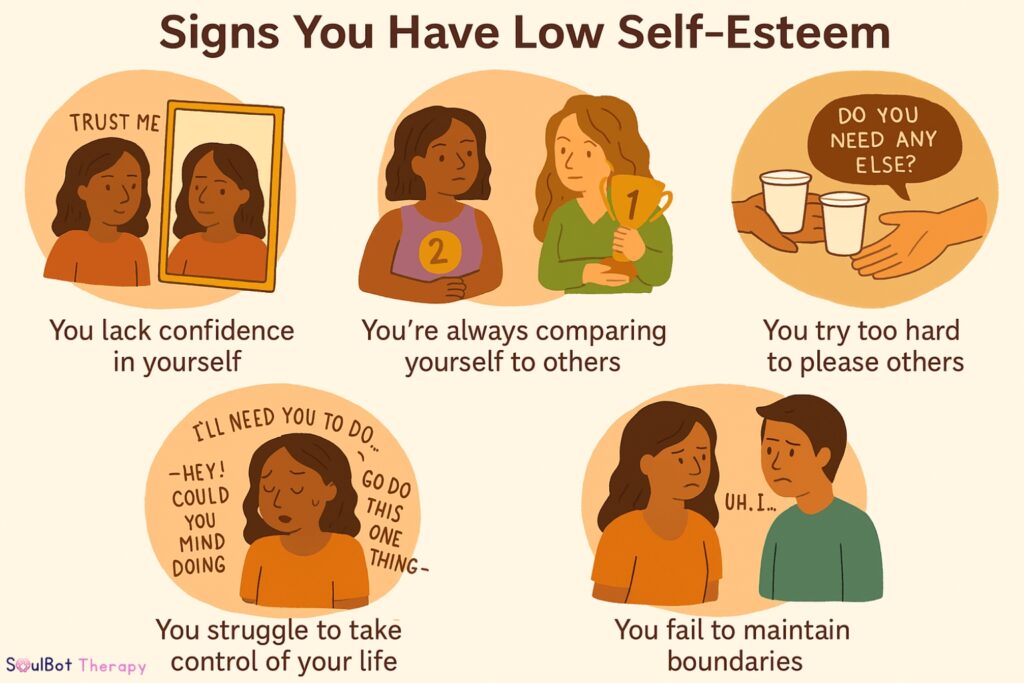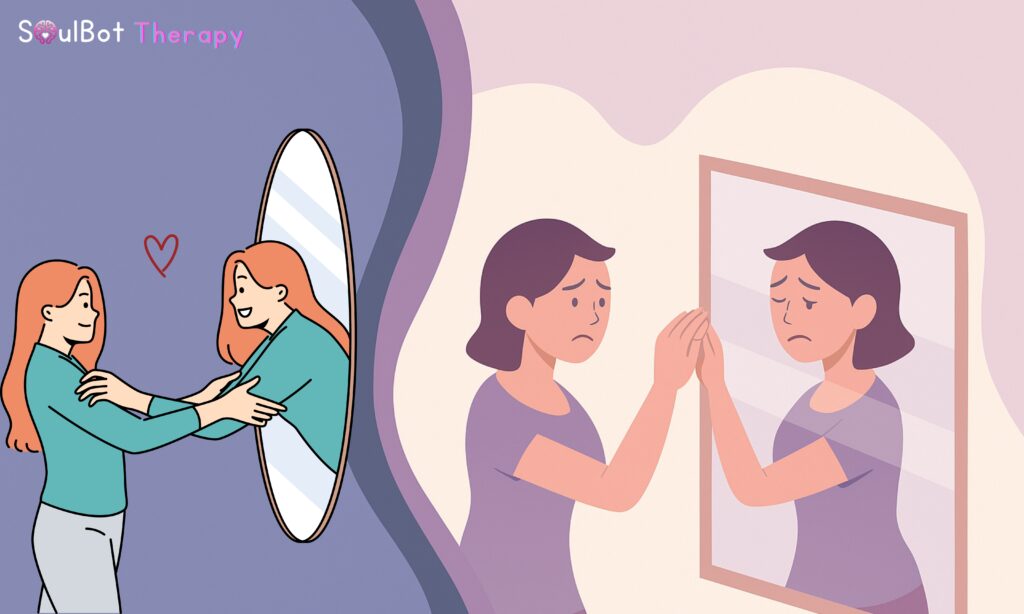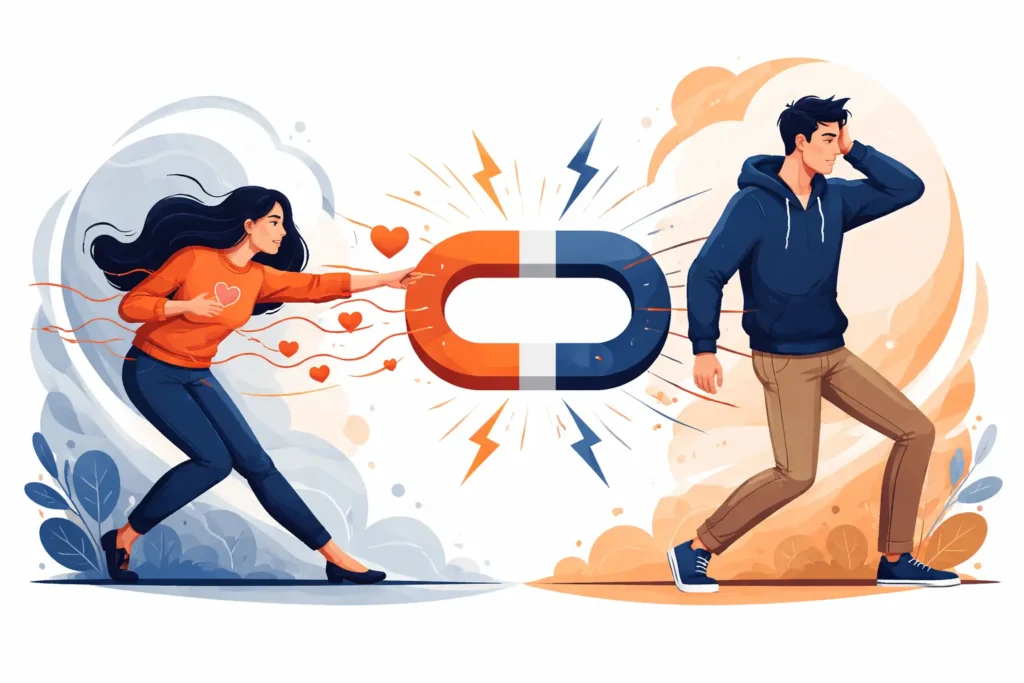You say you’re “fine.” But deep down, something feels off, and you might think, Do I Have Low Self-Esteem?
- You second-guess compliments.
- You apologise for things that aren’t your fault.
- You shrink when you should speak up.
- It doesn’t always feel like self-hate — but it doesn’t feel like self-worth.
What you’re experiencing might not be just a rough patch.
It might be low self-esteem — and recognizing it is the first step to reclaiming your confidence.
In this guide, we’ll explore what self-esteem means and the low emotional signs and give you a short, psychology-backed self-check to help you tune into how you really feel about yourself — no fluff, no shame, just clarity.
What Is Self-Esteem, Really?
Self-esteem is more than confidence.
It’s more than liking yourself when you’re doing well.
It’s your baseline belief about your value — especially when things go wrong.
- Do you believe your thoughts matter?
- Do you stand up for your needs?
- Do you show yourself grace when you fail?
If the answer is “not really,” that’s where self-esteem shows its cracks.
And those cracks can lead to everything from overthinking and emotional burnout to anxiety, avoidance, and self-sabotage.
💡According to the American Psychological Association, self-esteem plays a major role in mental health, influencing how we view ourselves and our value in the world.

What are the 10 Emotional Signs of Low Self-Esteem
You don’t need to “hate yourself” to have low self-esteem. In fact, most people with low self-worth are high-functioning, helpful, and hardworking. But they quietly carry self-doubt under the surface. Here’s how it shows up:
1️⃣ You over-apologize
As a result, you say “sorry” for existing, for asking, for needing—ultimately, for simply being.
2️⃣ You downplay your achievements
You brush off praise. You tell people, “It wasn’t a big deal.”
Deep down, you fear you don’t really deserve it.
3️⃣ You crave external validation
You often need others to ensure you made the right choice, looked good, or did well.
4️⃣ You sabotage your progress
You procrastinate. Cancel things you care about. Push people away when things feel good.
5️⃣ You struggle to say “no.”
You let people overstep because setting boundaries feels selfish or scary.
6️⃣ You fear being “too much”
As a result, you fear being “too much”—too loud, too needy, or too sensitive. Consequently, you may hold back to avoid judgment. However, suppressing your true self can lead to frustration and self-doubt.
7️⃣ You accept poor treatment
Because part of you believes, “This is what I get.”
8️⃣ You replay mistakes more than wins
You forget praise instantly but replay criticism for weeks.
9️⃣ You feel like a burden
You hesitate to ask for help — or feel guilty when you do.
🔟 You compare yourself constantly
No matter how well you’re doing, someone else seems better.
💬 “Low self-esteem isn’t always loud. Sometimes, it whispers through overthinking and self-sacrifice.”
Why Do I Have Low Self-Esteem?
Most of us don’t wake up one day doubting ourselves. It happens slowly — and often early.
It could arise from:
- Critical parenting or invalidation
- Trauma or neglect
- Bullying or social rejection
- Perfectionist environments
- Being shamed for emotions or needs
Over time, your brain learns:
- “I’m only lovable if I perform,” reinforcing the need for external validation.
- “I’m too much,” leading to self-doubt and hesitation in expressing emotions.
- “I’m not enough,” fostering feelings of inadequacy and unworthiness.
That becomes your default — unless you consciously rewrite the story.
💡Want to explore how self-esteem ties into your emotional responses? Check out our guide on emotional intelligence in relationships.
SoulBot Self-Esteem Self-Check
Let’s take a quick check-in.
Answer honestly — this is for you, not anyone else.
1. Do you struggle to trust your own decisions without validation?
2. Do compliments make you uncomfortable or feel untrue?
3. Do you feel guilty for resting, asking, or saying no?
4. Do you tolerate disrespect because it feels “normal”?
5. Do you regularly feel “insufficient” — even when doing everything?
If you answered "yes" to three or more, then it may be time to reflect on your experiences. As a result, you might be tolerating behaviours that undermine your self-worth. However, recognizing these patterns is the first step toward change.
Your self-esteem might need some care.🧪 Take the Full Self-Esteem Test →
- Psychology-backed
- Zero judgment
- Instant insight into how you view yourself
📊 What Your Score Means
- ✅ 0–1 “Yes” Answers → Strong self-esteem foundation
- 🟡 2–3 “Yes” Answers → You hold some self-trust but struggle with consistency
- 🔴 4–5 “Yes” Answers → You may be living with low self-esteem patterns
You’re not broken. You’re just carrying beliefs that don’t belong to you anymore.
How to Start Rebuilding Your Self-Esteem
Self-esteem isn’t built overnight. It’s built day by day, one self-trust moment at a time.
💭 1. Catch Your Inner Critic
Notice when your self-talk is cruel or doubting.
Ask: “Would I speak to a loved one like this?”
🛑 2. Set Micro-Boundaries
Say no. Ask for space. Stop over-explaining.
Each one sends the message: “I matter.”
✅ 3. Keep Small Promises to Yourself
- Show up on time
- Drink water
- Send that email
- Self-trust stacks up through repetition.
🧍♀️ 4. Spend Time With People Who Reflect Your Worth
If someone only values your stillness, kindness, or smile — it’s not a real connection.
💖 Ready to Check In With Yourself?
🧪 Take the SoulBot Self-Esteem Test — a quick, psychology-informed self-check to help you explore your self-belief patterns.
- ✨ Takes less than 2 minutes
- 📊 Provides instant insight
- 💬 No pressure, just support
👉 Take the Test Now →








